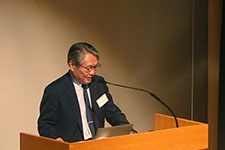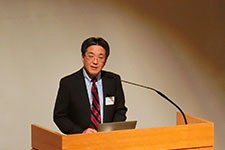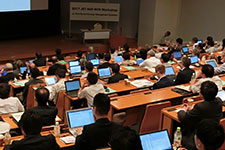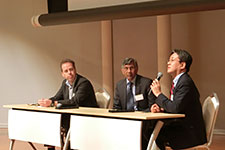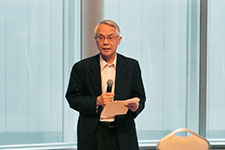https://www.jst.go.jp/kisoken/crest/research_area/ongoing/bunyah24-1.html
JST-CREST “Creation of Fundamental Theory and Technology to Establish a Cooperative Distributed Energy Management System and Integration of Technologies Across Broad Disciplines Toward Social Application (EMS)” (Research Supervisor: Prof. Masayuki Fujita, Tokyo Institute of Technology), NSF (National Science Foundation) and the RCN (The Research Council of Norway) jointly held the 2017 JST-NSF-RCN Workshop on Distributed Energy Management Systems in Akihabara, Tokyo. Following the success of the last three international workshops in 2013 (Hawaii), 2015 (Virginia), and 2016 (Heidelberg), this 4th workshop was organized in order for all participants to share research progress and develop a network among each other for future collaborations. About 140 participants, including 110 researchers mainly from CREST-EMS in Japan and 19 researchers from the US, 8 from Norway, 2 from Italy as well as China and Germany took part in the workshop.
At the opening talk, Dr. Yoshimasa Goto, Executive Director of JST, stated that a number of collaborative research projects were promoted through the fruitful past three workshops. He also presented that international cooperation and collaboration in different fields are effective for responding to increasing demands for novel theories and systems.
Afterwards, Prof. Masayuki Fujita, Research Supervisor to CREST-EMS, Dr. Kishan Baheti, Program Director at NSF and Dr. Svein Grandum, Counsellor, Science and Technology, Royal Norwegian Embassy, presented the objectives of the workshop and expectations for each of the coming sessions, at the opening session. They shared the importance of strengthening existing networks to deliver innovative solutions to society’s energy challenges by leveraging international research collaborations.
At the keynote lecture, Dr. Pramod Khargonekar, Vice Chancellor for Research at University of California Irvine, lectured on trends and subjects of renewable energy and future visions for targeting 100% installation.
Each research team of CREST and young researchers also made their presentations. Five research directors of the CREST-EMS, Prof. Jun-ichi Imura, Prof. Kenko Uchida, Prof. Tatsuya Suzuki, Prof. Takashi Nakajima and Prof. Yasuhiro Hayashi, representing Japan, introduced their research efforts in relation to the topics of the workshop and progress, and issues of international cooperation.
For example, the team of Prof. Hayashi and the team of University of Tennessee headed by Prof. Kevin Tomsovic, developed a Japan-US electricity transmission and distribution network model for the first time in the world, by linking US transmission and the Japan distribution model each other. Using this combined model, the teams revealed the possibility to solve the problem of power quality degradation both in transmission and distribution systems concurrently, under the situation of transmission accidents, which had not been achieved until then.
Prof. Mario A. Rotea from the University of Texas at Dallas and 10 presenters from U.S.A., Dr. Boye Annfelt Høverstad from SINTEF and 4 researchers from Norway, and a researcher from Germany presented about research and issues of international cooperation. In young researchers’ sessions, five researchers in Japan and four researchers from the U.S.A. made presentations. A poster session was also organized and 20 researchers from CREST-EMS, 2 from Italy, and 1 from China presented and actively discussed with all participants from other countries.
At the open discussion for the best practices of international collaborative research, several important requirements were recognized to sustain international cooperation; including continuous exchange and support for students and young researchers, expanded research supports for ongoing international collaborative research projects, and consideration of a mechanism for evaluating impacts on international cooperation. In addition, the current problems facing each country and the possibility of sharing information among countries were also discussed.
At the closing session of the workshop, Dr. Michiharu Nakamura, Advisor for Science and Technology at JST and other representatives of FAs were pleased with the successful networking and practical international cooperation that has been built as a result of the past three workshops. They also emphasized importance of FA’s further support to the EMS research area in close cooperation with other funding agencies.
On the following day of the workshop, a site visit to Waseda University EMS Sinjuku R&D Center and Toshiba R&D center was organized. Participants observed the experiment facility of Home Energy Management Systems (HEMS), a power supply and load simulator, and a smart building model. They actively exchanged opinions, questions and answers with project researchers.
It is expected that the four workshops, including the most recent, and additional support from funding agencies, will lead to further promotion of international cooperation and leverage innovative research in the field of cooperative distributed energy management systems continuously in the future.
